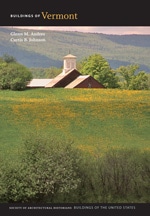
With its fishing shed, summer camp, and boathouse, the Hunt camp in the “Randolph Colony” on the southwestern shore of Caspian Lake illustrates the typical buildings of the period between 1890 and 1920 when the lake developed into a popular summer resort. Avery Wheeler of Randolph began camping with his family in the area beginning in 1879. Benjamin Sanborn, who published school textbooks in Boston, bought an adjoining parcel of land in 1895 from farmer Henry Tolman and began selling one-acre lots to educators he met while selling textbooks, including many in Randolph. Burlington educators Lyman Hunt and Lyman Hunt Jr. selected a lot with a small, gable-front fishing shed like that of Wheeler's and other fishing camps then on the lake. Not long after they also erected a one-and-a-half-story, gambrel-roofed cottage, also typical, but distinguished by its ornamented gambrel front with an alternating pattern of diamond and square shingles. About 1910 they renovated and expanded its original front porch into a wraparound porch with shingled walls and posts. This was probably the work of the Perrin brothers, who constructed several camps in the growing lake-side community. Somewhat later at the edge of the lake the Hunts added a wood-frame, novelty-sided boathouse with the lower half of its gable front open to the water and interior docks and stairs that rise and exit at the other gable end to shore level.














